| SHADOWS ON THE WALL | REVIEWS | NEWS | FESTIVAL | AWARDS | Q&A | ABOUT | TALKBACK | |||||||||||||||||||||||||||||
 Shadows off the beaten path Shadows off the beaten pathIndies, foreigns, docs and shorts...
On this page:
BLUE JEAN |
IT IS IN US ALL |
THE JUSTICE OF BUNNY KING
| |||||||||||||||||||||||||||||
| See also: SHADOWS FILM FESTIVAL | Last update 23.Sep.22 | |||||||||||||||||||||||||||||
|
Blue Jean Review by Rich Cline |  MUST
MUST  SEE SEE
| 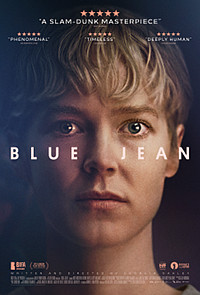 dir-scr Georgia Oakley prd Helene Sifre with Rosy McEwen, Kerrie Hayes, Lucy Halliday, Lydia Page, Becky Lindsay, Maya Torres, Ellen Gowland, Amy Booth-Steel, Stacy Abalogun, Izzy Neish, Kate Soulsby, Lainey Shaw release UK Oct.22 lff 22/UK BBC 1h37   Is it streaming?
| 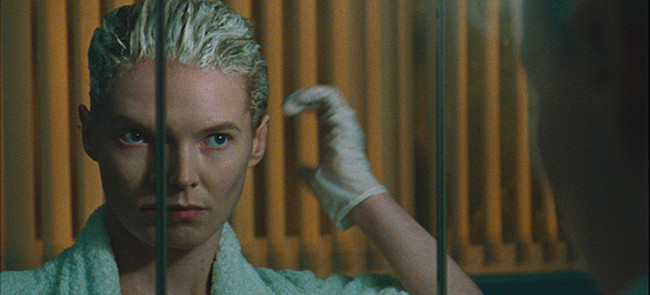 Set in a northern English seaside town during the tumultuous Thatcher years, this drama has an earthy realism that finds timely themes almost 35 years ago. While the personal story is compelling and full of involving detail, it's not always easy to watch a film in which everyone is so miserable. Thankfully, writer-director Georgia Oakley finds moments of humour and joy along the way, and the cast is excellent. In 1988, with protests in streets up and down the country about the Tories' anti-gay Clause 28, thoughtful PE teacher Jean (McEwan) must keep her cheeky girlfriend Viv (Hayes) a secret from everyone but their buddies at an underground lesbian bar. But troubled new student Lois (Halliday) is there too one evening, and Jean is terrified of being outed at school, even as she tries to help Lois fit in. This forces Jean to make some tough choices. And Viv is finding it difficult being with someone who isn't ready to live her true life. With its dark, melodramatic tone, the film feels like it could have been made in 1988, apart from its clear, unblinking eye on the topic. Even with its lighter touches, the script is full of gritty intensity, fiery clashes and big dramatic beats. When the bully (Page) sets out to get Lois thrown off the team, the situation is frighteningly clear to Jean, but she's unable to take an honest stand. Still, the film manages to make Jean sympathetic even when she does the wrong thing, because she knows what's right. And there's a depth in her experience that informs what she does next. The striking McEwan has a loose, genuine demeanour that's hugely engaging, especially since we can see fear in her eyes as she hears casual bigotry all around her, accompanied by news reports full of hateful government statements. She has intriguingly offbeat chemistry with Hayes as the much more unapologetic Viv. Their relationship has realistically rough edges that offer important insight. And newcomer Halliday makes a strongly unapologetic debut as the wounded but tenacious Lois. While Britain got rid of Clause 28 in 2003, this film serves as a reminder of such entrenched bigotry not that long ago, and also how things still are in much of the world. We know that both Jean and Lois would have very different experiences in the same situation today, and this film finds moments of hopefulness in some beautifully played moments, such as when Jean embraces her sexuality in public for the first time.
|
| It Is in Us All Review by Rich Cline | 
| 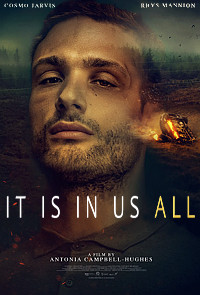 dir-scr Antonia Campbell-Hughes prd Emma Foley, Tamryn Reinecke with Cosmo Jarvis, Rhys Mannion, Claes Bang, Antonia Campbell-Hughes, Isaac Heslip, Keith McErlean, Shashi Rami, Mark O'Halloran, Lalor Roddy, Pauline Hutton, Peter Trant, Paul Tylak release US Mar.22 sxsw, Ire/UK 23.Sep.22 22/Ireland 1h32 Is it streaming?
| 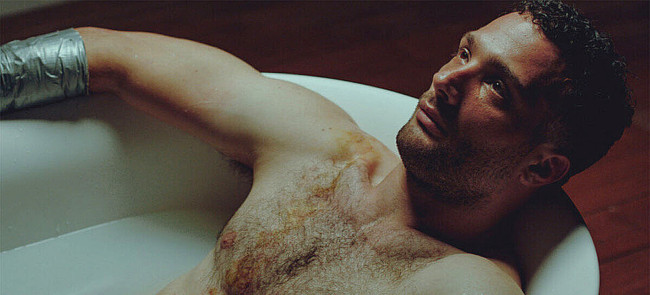 Moody and atmospheric, this Irish drama gets under the skin of its characters without offering too much in the way of detail. With a story that circles around a momentous event, actor-filmmaker Antonia Campbell-Hughes is exploring undefinable connections between people, so the film is naturally rather elusive. But its open-handed approach finds strong resonance, especially with such bracingly emotive performances from a fine cast in such beautiful settings. When his aunt dies and leaves him her home, London film designer Hamish (Jarvis) heads to Donegal to sort out the paperwork, intending to turn things around for a quick sell. But a car accident leaves him injured, and the coastal house intrigues him more strongly than expected. So he sets out to learn more about his mother and aunt, while also connecting with teen Evan (Mannion), whose best friend was killed in the crash. Hamish's father (Bang) and the boy's grieving mother (Campbell-Hughes) can't understand why Hamish doesn't just sell up and leave. Each relationship in this film hinges on something inexplicable, most notably the offhanded connection between Hamish and Evan, which is never defined by any traditional storytelling language. Yes, they share a bond from this near-death experience, but there's something else going on here, whether it's emotional, romantic or simply the recognition of kindred soul. The film is full of these kinds of suggestive interactions, which hold the interest as the narrative unfolds without much in the way of overt plotting. Jarvis brings his magnetic presence to the central role, giving Hamish sometimes awkward physical and verbal patterns while allowing emotions to gurgle up and boil over. It's a full-bodied performance that resonates on unexpected levels as Hamish excavates his family's past to discover some properly difficult things about himself. Taking a more extroverted approach, Mannion offers an equally unfiltered performance as Evan, a curious kid whose close encounter with his mortality sparks some unruly reactions. And the cast is packed with especially vivid side roles. With such serious subject matter, it helps that there's also a lovely blast of humour throughout the film, grounding the characters in a recognisable reality. This creates a clear sense of the local culture and also helps us sympathise with them, even when they give in to very bleak thoughts. And Campbell-Hughes creates a wonderfully evocative atmosphere using design, music and cinematography that feel almost otherworldly. This further cuts through the surfaces to reveal emotions that are very difficult to face but are somehow cathartic as well.
|
| The Justice of Bunny King Review by Rich Cline | 
| 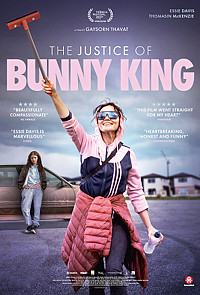 dir Gaysorn Thavat scr Sophie Henderson prd Emma Slade with Essie Davis, Thomasin McKenzie, Toni Potter, Erroll Shand, Lively Nili, Anapela Polataivao, Angus Stevens, Amelie Baynes, Tanea Heke, Ryan O'Kane, Phil Peleton, Xana Tang release UK Aug.21 eiff, US 23.Sep.22 21/NZ 1h41 Is it streaming?
| 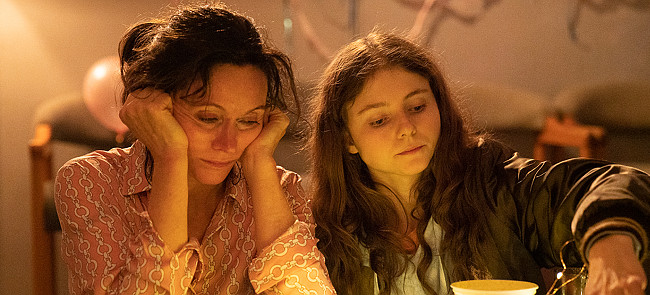 Centring on a flawed woman whose optimism drives a relentless sense of right and wrong, this New Zealand drama has a somewhat stilted narrative. Thankfully, it's anchored by another arresting turn from Essie Davis. With her first feature, director Gaysorn Thavat deploys an earthy, realistic tone that highlights serious social issues. And the offhanded performances add depth of feeling that just about papers over the pushy, contrived plot points. Working as a windscreen-washer on the streets of Auckland, the energetically resourceful Bunny (Davis) is living with her sister Grace (Potter) while trying to save up for a place of her own so she can regain custody of her children, 14-year-old Reuben (Stevens) and 5-year-old Shannon (Baynes). When she witnesses Grace's boyfriend (Shand) behaving inappropriately with Grace's teen daughter Tonyah (McKenzie), the angry fallout forces Bunny to find a new home. And as her ongoing actions create increasing tension throughout her life, she and Tonyah find themselves at the centre of a standoff situation. While noting that Bunny is an ex-con, the script waits until the final act to fill in details that everyone else uses to judge her harshly. No one believes what she says, including various social services officers, and her short temper doesn't help matters. Nor does her refusal to follow rules. That said, her motives are right-on, as are her impulsive mother-hen instincts. So it's a bit frustrating that the script throws her into predicaments that feel exaggerated for cinematic effect. Despite the naive writing, Davis storms through the film with a remarkable looseness that feels realistically out of control. Bunny's decisions often make things worse, but Davis reveals that her heart is in the right place, refusing to let a cruel system break her while maintaining hope that she can turn things around. Opposite her, McKenzie has great presence as Tonyah, even if her character isn't deepened beyond the potential peril of her circumstances. People in cars scream at Bunny to "get a real job", which is precisely what she's unable to do with a criminal record and no permanent address. Bunny may have caused much of her misfortune, but this doesn't mean she's a bad mother. And the way she stubbornly defends those at risk is properly inspiring. On the other hand, her methods are sometimes so radical that there seems to be no way for her to come back from this. So the film's most vital kick comes in how she gives Tonyah the strength speak her truth.
| 
See also: SHADOWS FILM FESTIVAL © 2022 by Rich Cline, Shadows
on the Wall
HOME | REVIEWS | NEWS | FESTIVAL | AWARDS
| Q&A | ABOUT | TALKBACK | | |||||||||||||||||
